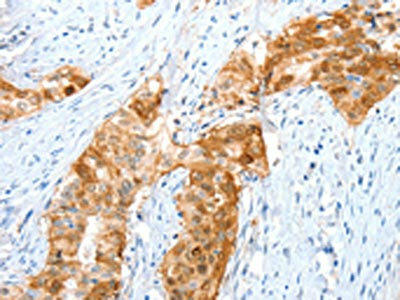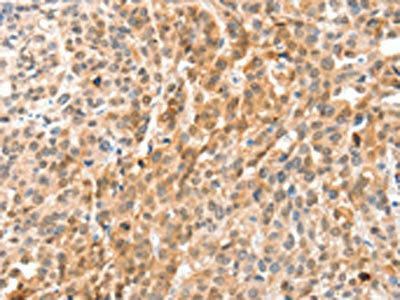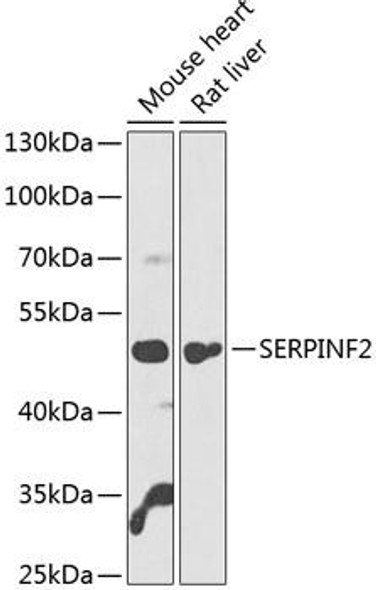ANXA8 Antibody (PACO14043)
- SKU:
- PACO14043
- Product Type:
- Antibody
- Reactivity:
- Human
- Mouse
- Rat
- Host Species:
- Rabbit
- Isotype:
- IgG
- Applications:
- ELISA
- WB
- IHC
- Antibody Type:
- Polyclonal Antibody
- Conjugation:
- Unconjugated
Frequently bought together:
Description
| Antibody Name: | ANXA8 Antibody (PACO14043) |
| Antibody SKU: | PACO14043 |
| Size: | 50ul |
| Host Species: | Rabbit |
| Tested Applications: | ELISA, WB, IHC |
| Recommended Dilutions: | ELISA:1:2000-1:5000, WB:1:200-1:1000, IHC:1:50-1:100 |
| Species Reactivity: | Human, Mouse, Rat |
| Immunogen: | Fusion protein of human ANXA8 |
| Form: | Liquid |
| Storage Buffer: | -20°C, pH7.4 PBS, 0.05% NaN3, 40% Glycerol |
| Purification Method: | Antigen affinity purification |
| Clonality: | Polyclonal |
| Isotype: | IgG |
| Conjugate: | Non-conjugated |
 | The image on the left is immunohistochemistry of paraffin-embedded Human cervical cancer tissue using PACO14043(ANXA8 Antibody) at dilution 1/35, on the right is treated with fusion protein. (Original magnification: x200). |
 | Gel: 10%SDS-PAGE, Lysate: 40 μg, Lane: A549 cells, Primary antibody: PACO14043(ANXA8 Antibody) at dilution 1/300, Secondary antibody: Goat anti rabbit IgG at 1/8000 dilution, Exposure time: 2 minutes. |
 | The image on the left is immunohistochemistry of paraffin-embedded Human esophagus cancer tissue using PACO14043(ANXA8 Antibody) at dilution 1/35, on the right is treated with fusion protein. (Original magnification: x200). |
| Background: | This gene encodes a member of the annexin family of evolutionarily conserved Ca2+ and phospholipid binding proteins. The encoded protein may function as an an anticoagulant that indirectly inhibits the thromboplastin-specific complex. Overexpression of this gene has been associated with acute myelocytic leukemia. A highly similar duplicated copy of this gene is found in close proximity on the long arm of chromosome 10. |
| Synonyms: | annexin A8 |
| UniProt Protein Function: | ANXA8: This protein is an anticoagulant protein that acts as an indirect inhibitor of the thromboplastin-specific complex, which is involved in the blood coagulation cascade. Belongs to the annexin family.Chromosomal Location of Human Ortholog: 10q11.22Cellular Component: late endosome membrane; plasma membrane; cytosolMolecular Function: actin filament binding; phosphatidylinositol-4,5-bisphosphate binding; phosphatidylinositol-3,4,5-triphosphate binding; calcium-dependent phospholipid binding; calcium ion binding; phosphatidylinositol-3,4-bisphosphate bindingBiological Process: endosome organization and biogenesis; blood coagulation; endosome transport |
| UniProt Protein Details: | |
| NCBI Summary: | This gene encodes a member of the annexin family of evolutionarily conserved Ca2+ and phospholipid binding proteins. The encoded protein may function as an an anticoagulant that indirectly inhibits the thromboplastin-specific complex. Overexpression of this gene has been associated with acute myelocytic leukemia. A highly similar duplicated copy of this gene is found in close proximity on the long arm of chromosome 10. [provided by RefSeq, Jul 2008] |
| UniProt Code: | P13928 |
| NCBI GenInfo Identifier: | 49257004 |
| NCBI Gene ID: | 653145 |
| NCBI Accession: | AAH73755.1 |
| UniProt Secondary Accession: | P13928,Q5VTM4, Q6GMY3, Q9BT34, A6NLM1 |
| UniProt Related Accession: | P13928 |
| Molecular Weight: | 36,881 Da |
| NCBI Full Name: | Annexin A8 |
| NCBI Synonym Full Names: | annexin A8 |
| NCBI Official Symbol: | ANXA8 |
| NCBI Official Synonym Symbols: | ANX8 |
| NCBI Protein Information: | annexin A8; VAC-beta; annexin-8; annexin VIII; vascular anticoagulant-beta |
| UniProt Protein Name: | Annexin A8 |
| UniProt Synonym Protein Names: | Annexin VIII; Annexin-8; Vascular anticoagulant-beta; VAC-beta |
| Protein Family: | Annexin |
| UniProt Gene Name: | ANXA8 |
| UniProt Entry Name: | ANXA8_HUMAN |









